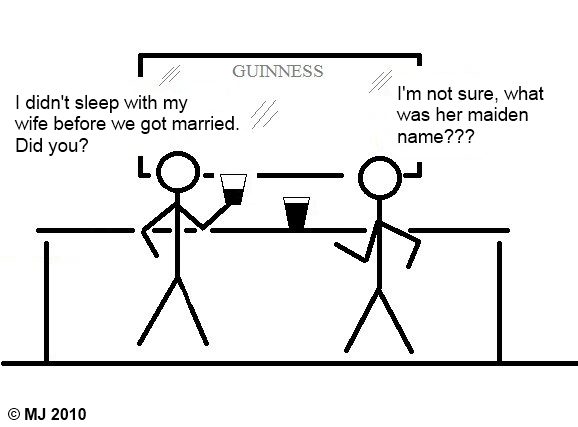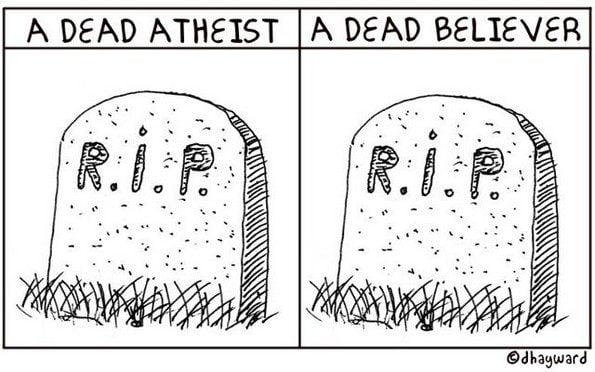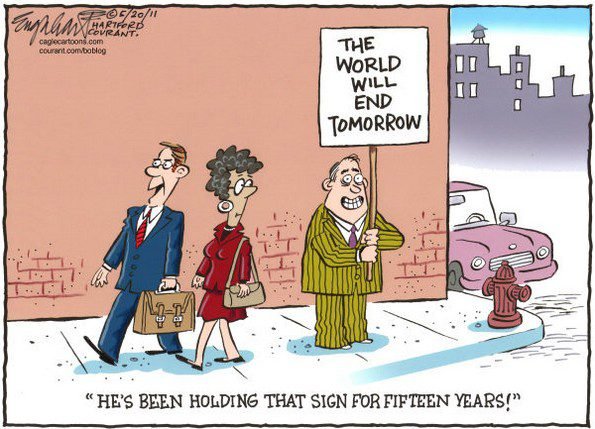
Recently, Mark and Jill Herringshaw wrote a post for Beliefnet titled, A Prayer Against Creeping Atheism. In the post, the Herringshaws express concern over what they see as “allocating certain areas of our lives (our sexuality in particular) to an atheistic philosophy that says, God’s not really involved in this area of my life. I’ll do it because it feels right.”
According to the Herringshaws, Psalm 10:4, 6, 11, 12b aptly describes the philosophy of atheists, pantheists, and Deists:
The wicked are too proud to seek God.They seem to think that God is dead. They think, “Nothing bad will ever happen to us! We will be free of trouble forever!”The wicked think, “God isn’t watching us! He has closed his eyes and won’t even see what we do!”They think, “God will never call us to account.”
From these verses, the Herringshaws extrapolate five points:
- God is dead.
- There are no standards of morality.
- Nothing and no one is holding us accountable.
- If there is a God, he is uninvolved in our lives.
- Nothing is bad, so, we can do whatever we please.
Like most Evangelicals, the Herringshaws have no clue as to what atheists actually think about life. Is atheism, in the strictest sense, a philosophy? Of course not. Atheism is nothing more than the lack of belief in gods. Atheists don’t think the Christian God is dead. This God was never alive to start with. To find people who think God is dead, I suggest that the Herringshaws take a careful look at Evangelicalism. From my seat in the pew, it looks to me as though there are millions of Evangelicals who believe God is dead. Look at the way many Evangelicals live their lives, indifferent to the teachings of the Bible and the lost condition of the world. Most Evangelicals rarely study the Bible. Most Evangelicals never share their faith with non-Christians. Apart from where their buttocks rest on Sunday morning, Evangelicals are, in every way, just like the unwashed, uncircumcised Philistines of the world.
Why are Evangelicals so worldly? Perhaps, they are the ones who think God is uninvolved in their lives. These world-loving Evangelicals are playing a religious version of Where is Waldo? Where is God? many Christians wonder. Their pastors and fellow church members bravely speak of a God who is intimately involved in their lives, but careful examination of their life histories tells a different story. Outside of helping Sister Bertha locate her car keys, God is nowhere to be found.
According to the Herringshaws, atheists have no standard of morality and believe that no behavior is bad. Again, it is evident that the Herringshaws don’t know much about how atheists live their day-to-day lives. Atheists, likes Evangelicals, have jobs, families, pets, cars, and homes. Our lives are quite similar to those of Evangelicals. Do the Herringshaws really think that atheists spend their days seeking out hedonistic pleasures, unaccountable to anyone but themselves? While I am sure there are atheists who live this way, most don’t.
Most of the atheists I know govern their lives based on humanistic morals and ethics. I wonder if the Herringshaws have ever read the Humanist Manifesto? If they have, they certainly wouldn’t have ignorantly suggested that atheists have no standard of morality. The Humanist Manifesto III states:
Humanism is a progressive philosophy of life that, without supernaturalism, affirms our ability and responsibility to lead ethical lives of personal fulfillment that aspire to the greater good of humanity.
The lifestance of Humanism—guided by reason, inspired by compassion, and informed by experience—encourages us to live life well and fully. It evolved through the ages and continues to develop through the efforts of thoughtful people who recognize that values and ideals, however carefully wrought, are subject to change as our knowledge and understandings advance.
This document is part of an ongoing effort to manifest in clear and positive terms the conceptual boundaries of Humanism, not what we must believe but a consensus of what we do believe. It is in this sense that we affirm the following:
Knowledge of the world is derived by observation, experimentation, and rational analysis. Humanists find that science is the best method for determining this knowledge as well as for solving problems and developing beneficial technologies. We also recognize the value of new departures in thought, the arts, and inner experience—each subject to analysis by critical intelligence.
Humans are an integral part of nature, the result of unguided evolutionary change. Humanists recognize nature as self-existing. We accept our life as all and enough, distinguishing things as they are from things as we might wish or imagine them to be. We welcome the challenges of the future, and are drawn to and undaunted by the yet to be known.
Ethical values are derived from human need and interest as tested by experience. Humanists ground values in human welfare shaped by human circumstances, interests, and concerns and extended to the global ecosystem and beyond. We are committed to treating each person as having inherent worth and dignity, and to making informed choices in a context of freedom consonant with responsibility.
Life’s fulfillment emerges from individual participation in the service of humane ideals. We aim for our fullest possible development and animate our lives with a deep sense of purpose, finding wonder and awe in the joys and beauties of human existence, its challenges and tragedies, and even in the inevitability and finality of death. Humanists rely on the rich heritage of human culture and the lifestance of Humanism to provide comfort in times of want and encouragement in times of plenty.
Humans are social by nature and find meaning in relationships. Humanists long for and strive toward a world of mutual care and concern, free of cruelty and its consequences, where differences are resolved cooperatively without resorting to violence. The joining of individuality with interdependence enriches our lives, encourages us to enrich the lives of others, and inspires hope of attaining peace, justice, and opportunity for all.
Working to benefit society maximizes individual happiness. Progressive cultures have worked to free humanity from the brutalities of mere survival and to reduce suffering, improve society, and develop global community. We seek to minimize the inequities of circumstance and ability, and we support a just distribution of nature’s resources and the fruits of human effort so that as many as possible can enjoy a good life.
Humanists are concerned for the well being of all, are committed to diversity, and respect those of differing yet humane views. We work to uphold the equal enjoyment of human rights and civil liberties in an open, secular society and maintain it is a civic duty to participate in the democratic process and a planetary duty to protect nature’s integrity, diversity, and beauty in a secure, sustainable manner.
Thus engaged in the flow of life, we aspire to this vision with the informed conviction that humanity has the ability to progress toward its highest ideals. The responsibility for our lives and the kind of world in which we live is ours and ours alone.
This modern statement of morality and ethics is in every way superior to the ancient, outdated teachings of the Bible. This document, unlike the Bible, has been revised several times, and therein lies the real problem for the Herringshaws. They are stuck with a book that cannot be updated or revised. They are forced to defend the morals and ethics of a 2,000 year old religious text.
What is the one issue that most upsets the Herringshaws? Human sexuality (see quote in first paragraph).
According to the Herringshaws:
Many Christians are engaging in forms of pre-marital sex (with or without the literal act), conveniently assuming that the standard of righteous sexual behavior prior to marriage is ambiguous in Scripture. Ironically, they have a legalistic perspective on what the sex act is. (Depending on what the definition of “is” is?!) Well, Paul certainly hinted at it in Ephesians 5:3. Can you take a hint?
When one hints about something, there is an underlying, implied message. The New Testament isn’t dogmatic; it doesn’t necessarily list emphatic do’s and don’t’s per se. It simply instructs us to keep our consciences clear. So what does constitute sexual immorality in unmarried couples? Answer: Whatever hints at sexual immortality. This would certainly include a lot of behaviors, particularly anything considered foreplay.
The reason for this is not to undermine our sexual fulfillment! Perish the thought! Great covenantal sex is one way in which Heaven is manifested on earth. It’s a tool to give great glory to God! It’s a weapon of spiritual warfare in our marriages, for it solidifies our marital unity.
In a post titled 50 Shades of Great, The Herringshaws remind Evangelicals that their sexuality belongs to the king of voyeurs, God:
Sex is God’s idea, and everything He created is good. We recognize the Bible as the authoritative manual for life, including sex. In this Manual, which is the Source of our existence, we find that there are boundaries around sex. These boundaries, like a safety rail, ensure that sex will be all God has designed it to be – abundant and joyful
….
Believers don’t take sex advice from best sellers nor from the media in general. We take our cues from our God who created sex in the first place (a trusting yet risky gift, as He knew how prone we would be to muck it up). And when we live by the Book, life is better, and sex is best.
It’s always been about sex. Evangelicals such as the Herringshaws are, like their God, voyeurs preoccupied with who is doing who, when, where, and how. What alarms the Herringshaws is the increasing number of Evangelicals who dare to keep God out of their sex lives. These whoopie-making Christians are increasingly ignoring the Puritanical morality they hear preached Sunday after Sunday from Evangelical pulpits. My God, these Evangelicals are having sex with whomever they please and they are having fun doing it. Can’t have that, right?
Again, is atheism to blame for the “immorality” that is spreading to every corner of the Evangelical church? Of course not. The blame rests on church leaders like the Herringshaws, who refuse to abandon the Bible’s antiquated, nonsensical teachings on sex. Times have changed. Evangelicals increasingly support same-sex marriage and fewer of them are waiting until marriage to have sex. Despite purity pledges and rings, Evangelical teenagers continue to engage in premarital sex. Like their atheist counterparts, Evangelicals increasingly know that sexual desire and intimacy are very much a part of what it means to be human. The Herringshaws need to understand that their battle against normal, healthy human sexual expression has been lost.



 Originally written in 2009. Edited for clarity and grammar.
Originally written in 2009. Edited for clarity and grammar.